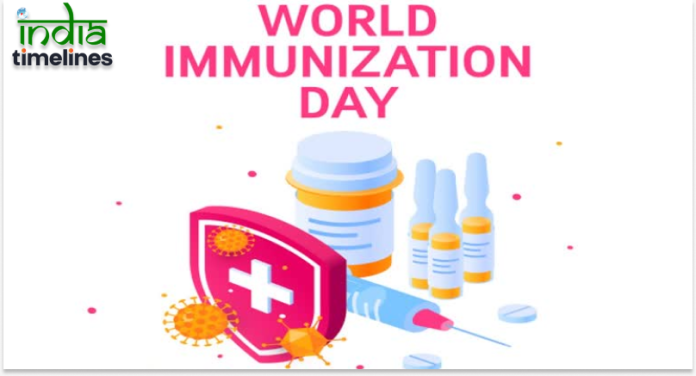
World Immunization Day, observed annually on November 10th, is a crucial global event dedicated to promoting the importance of vaccines in protecting public health. As we step into 2024, this day serves as a reminder of the incredible achievements in immunization and the ongoing efforts needed to ensure that everyone, everywhere has access to life-saving vaccines. In this article, we will explore the significance of World Immunization Day, the progress made in vaccination, the challenges faced, and the future of immunization efforts.
History of World Immunization Day
World Immunization Day was established to raise awareness about the importance of vaccination and its role in preventing diseases. The event traces its roots back to the late 1990s when the World Health Organization (WHO) launched initiatives aimed at increasing global vaccination coverage.
Historically, vaccines have transformed public health, significantly reducing the incidence of infectious diseases. Key milestones include the development of the smallpox vaccine by Edward Jenner in 1796 and the widespread introduction of vaccines for diseases like polio and measles. These breakthroughs have saved millions of lives and continue to be a vital part of public health strategies worldwide.
The Importance of Vaccination
Vaccines are one of the most effective tools in preventing diseases. They protect individuals and communities by reducing the risk of outbreaks and epidemics. In 2024, as the world reflects on recent health crises, including the COVID-19 pandemic, the critical importance of vaccination is more evident than ever.
Statistics highlight the impact of vaccines. For instance, the Global Polio Eradication Initiative has led to a 99% reduction in polio cases since its inception in 1988. Vaccines also play a pivotal role in preventing diseases like measles, rubella, and hepatitis, underscoring their value in public health.
Current Vaccination Landscape
Despite the successes, challenges remain in achieving universal vaccination coverage. In 2024, vaccination rates vary across regions, with some countries experiencing low immunization due to factors such as access barriers, misinformation, and vaccine hesitancy.
The COVID-19 pandemic disrupted routine immunization services, leading to a decline in vaccination coverage for other diseases. As a result, many countries face a resurgence of vaccine-preventable diseases. Addressing these challenges is crucial to ensuring that everyone has access to necessary vaccines.
Global Vaccination Initiatives
Organizations like WHO and UNICEF play a pivotal role in implementing global vaccination programs. Initiatives such as GAVI, the Vaccine Alliance, provide vaccines to low-income countries, ensuring that vulnerable populations receive the protection they need.
Significant campaigns, like the Measles & Rubella Initiative, have successfully increased vaccination coverage and reduced disease incidence. These efforts are essential for achieving global health targets and ensuring that no one is left behind in the quest for immunization.
Immunization Myths and Misconceptions
Misinformation poses a significant barrier to vaccination efforts. Common myths about vaccines, such as the incorrect belief that they cause autism, can deter individuals from seeking immunization for themselves and their children.
It’s essential to debunk these myths and provide accurate information about the safety and efficacy of vaccines. Education plays a critical role in combating misinformation and building public trust in vaccination programs.
Vaccination and Children
Childhood vaccinations are vital for protecting young individuals from serious diseases. The recommended immunization schedule includes vaccines for diseases such as measles, mumps, rubella, and polio.
In 2024, health organizations emphasize the importance of ensuring children receive their vaccinations on time, as delays can leave them vulnerable to outbreaks. Parents and caregivers play a crucial role in prioritizing their children’s health through timely immunization.
The Role of Healthcare Providers
Healthcare professionals are key advocates for vaccination. They educate patients about the benefits of vaccines, address concerns, and encourage individuals to stay up to date with their immunizations. In 2024, patient education remains vital, as informed individuals are more likely to participate in vaccination programs.
By fostering trust and understanding, healthcare providers can help combat vaccine hesitancy and promote public health.
Innovations in Vaccination
The field of vaccination continues to evolve, with new technologies and approaches emerging. Innovations such as mRNA vaccines have demonstrated remarkable efficacy during the COVID-19 pandemic, paving the way for future developments in vaccine research.
In 2024, researchers are exploring next-generation vaccines that may offer broader protection against multiple diseases and improve delivery methods. These advancements hold great promise for enhancing global immunization efforts.
Challenges to Global Immunization
Despite progress, significant challenges to global immunization efforts remain. Barriers to access, including geographic, economic, and social factors, hinder vaccine delivery in many regions.
Political instability and misinformation can also undermine vaccination campaigns, making it essential for governments and organizations to work collaboratively to address these issues.
Celebrating World Immunization Day
World Immunization Day serves as a platform for raising awareness about vaccination and encouraging participation in immunization programs. In 2024, global events and activities will bring communities together to celebrate the importance of vaccines in protecting health.
Individuals can participate by advocating for vaccination, sharing accurate information on social media, and supporting local immunization initiatives. Every action contributes to a healthier future.
The Future of Vaccination
The future of vaccination looks promising, with ongoing research and innovation shaping the landscape. Experts predict that vaccine research will continue to advance, leading to the development of new vaccines that provide greater protection against emerging diseases.
As global health priorities evolve, strategies to ensure that everyone has access to vaccines will also adapt, promoting a healthier world for all.
Conclusion
World Immunization Day 2024 serves as a vital reminder of the importance of vaccines in protecting public health. As we celebrate this day, let us reflect on the progress made, the challenges that remain, and our collective responsibility to ensure that everyone has access to lifesaving vaccinations. Together, we can work toward a future where vaccine-preventable diseases are a thing of the past.
FAQs
- What is World Immunization Day?
World Immunization Day is celebrated on November 10th to promote the importance of vaccines and raise awareness about their role in public health. - Why are vaccines important?
Vaccines protect individuals from infectious diseases, reduce the incidence of outbreaks, and save millions of lives each year. - What are some common misconceptions about vaccines?
Common myths include the false claim that vaccines cause autism and that natural immunity is better than vaccine-induced immunity. - How can individuals support vaccination efforts?
Individuals can advocate for vaccination, educate themselves and others, and participate in local immunization initiatives. - What challenges does global immunization face?
Challenges include access barriers, vaccine hesitancy, misinformation, and political factors affecting vaccination campaigns.





































